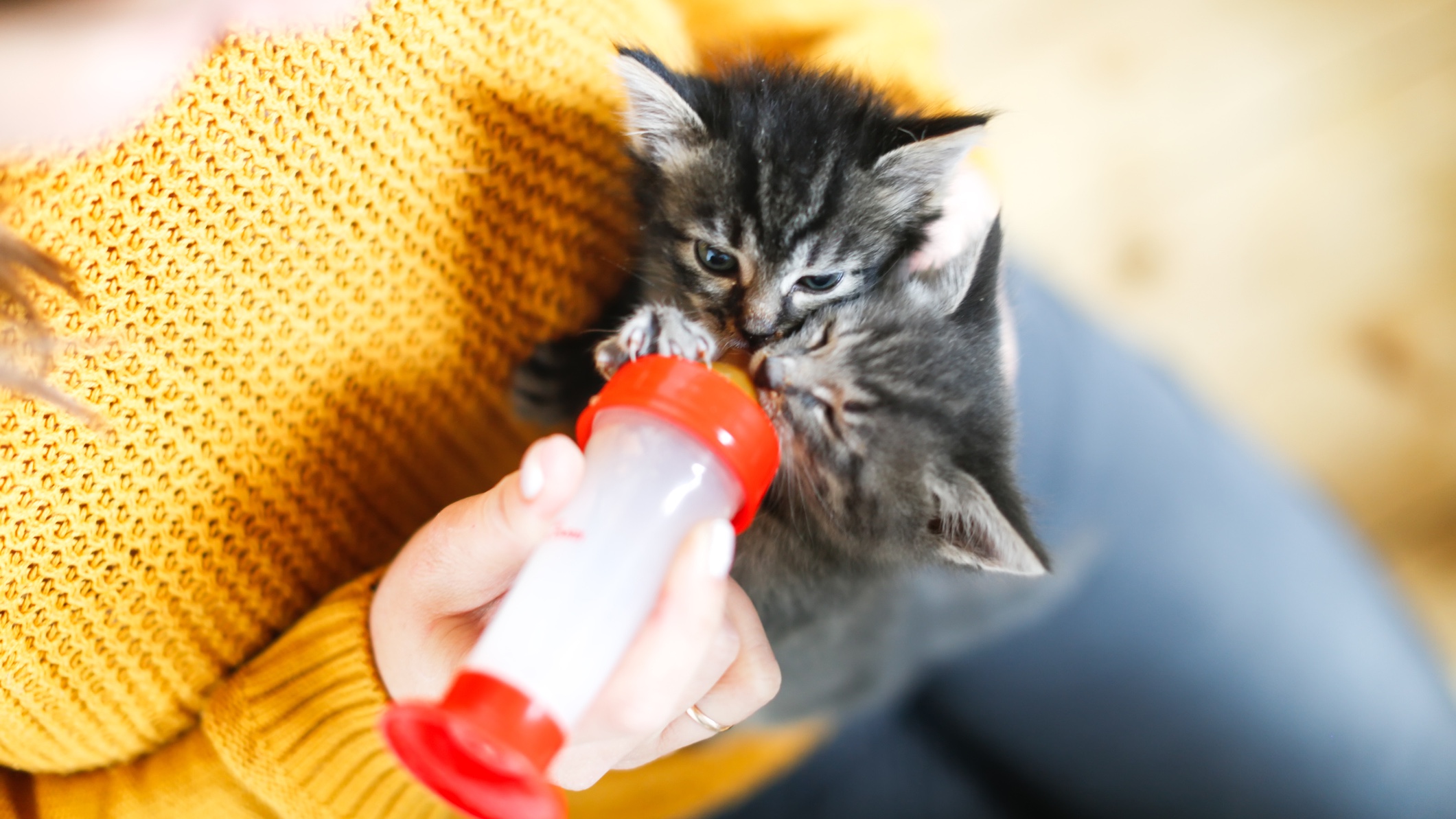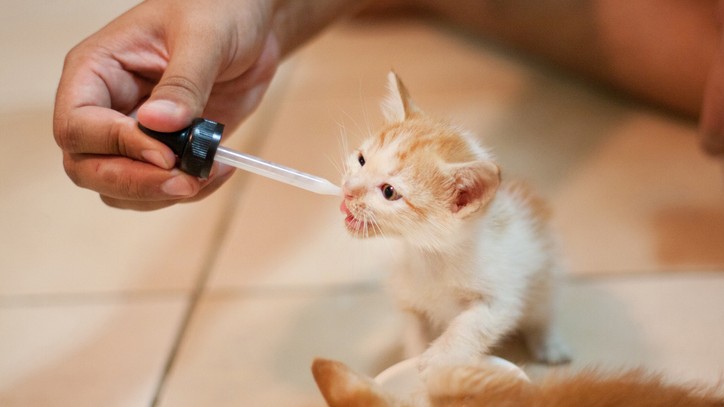Kitten care for a healthy, happy pet according to a vet
Kitten care is vital for the wellbeing of your pet and it's more involved than you may think

You need to know the basics of kitten care if you’re introducing one as a pet into your home. While kittens (and cats come to that) are known to be independent creatures, you still need to nurture and look after them.
That means going way beyond merely feeding them the best kitten food (as important as that is). It involves ensuring kittens are socialized, given medical care as and when required and lavished with attention – which means it’s time to splash some cash on the best kitten toys.
To help your kitten get off to a flying start, we asked expert vet Dr Catherine Barnette for some kitten care tips. Here she explains why it’s vital to understand your kitten’s physical and psychological needs while discussing the adjustments you need to make to ensure your pet feels at home in your house.
Top six kitten care tips: A vet's guide
1. Work with your vet
Don’t feel as if you’re alone when it comes to caring for your kitten. As well as being able to take on board heaps of advice from the team here at PetsRadar, you should also have a valuable resource close to home to help you with kitten preventative care needs.
We’re talking, of course, about your vet. “Veterinary care is essential to ensure that your cat receives necessary disease-preventing vaccines, parasite prevention, and deworming – as well as to help you solve problems, such as a kitten not eating,” Dr Barnette says.
You should schedule your kitten’s first veterinary visit within the first few days of bringing your pet home. “Your veterinarian will perform a thorough physical examination, looking for signs of illness and underlying health issues,” Dr Barnette adds. “Your veterinarian will also review your kitten’s medical records, to determine what medical care your cat needs. Depending on your kitten’s medical history, your veterinarian may recommend vaccines, a fecal parasite exam, and/or infectious disease testing.”
2. Don’t skimp on vaccines

It’s important to keep up-to-date with cat and kitten vaccinations. “Kittens typically visit the veterinarian every three to four weeks, from eight to sixteen weeks of age,” Dr Barnette says. “After the initial kitten vaccine series, vaccinations will decrease in frequency to once every one to three years.”
Get the best advice, tips and top tech for your beloved Pets
The initial series of kitten vaccines will protect your kitten against several feline viral illnesses, including rhinotracheitis (feline herpes virus), calicivirus, panleukopenia, feline leukemia virus, and rabies.
“While it may seem challenging to fit these frequent kitten vaccine visits into your hectic schedule, it’s important to set aside the time to do so,” Dr Barnette adds. “Missing vaccine visits can put your kitten at risk for serious and potentially fatal viral infections.”
3. Have your kitten spayed or neutered before six months of age
Unless you want many more kittens on your hands in the future (and chances are you don’t), ensure your kitten is spayed or neutered before they reach reproductive maturity. This will prevent accidental breeding and avoid contributing to pet overpopulation.
To that end learn more about neutering your pet. “Spay/neuter surgery can directly benefit you and your kitten,” Dr Barnette explains. “Cats in heat can be difficult to be around, vocalizing loudly and attempting to escape the house while intact males may urine mark inside the home, as well as attempting to escape in search of in-heat females.”
Spay/neuter surgery makes cats more pleasant while reducing the likelihood that your kitten will be injured while out roaming. “Spaying and neutering also reduces the likelihood of your cat developing certain types of cancers and has been shown to increase a cat’s lifespan,” Dr Barnette adds.
4. Use a prescription product to prevent parasites

Parasites, such as fleas, intestinal worms, and heartworms, pose a serious risk to cats and they’re among 32 of the most common illnesses in cats. Fleas aren’t just disgusting and annoying; they can spread serious viral infections. Intestinal worms can trigger vomiting and diarrhea, while heartworms can be deadly.
It’s wise, then, to learn how to treat a kitten with worms and to give your pet a veterinarian-recommended parasite preventative treatment (beginning in kittenhood and continuing throughout the remainder of your cat’s life) is widely advised by vets.
“Although over-the-counter flea preventatives are available in many pet supply stores, these products do not protect against heartworms or intestinal worms,” Dr Barnette says. “They also tend to be less effective than prescription parasite preventatives, with a higher risk of side effects.”
And don’t ignore this advice if you have an indoor cat. Ves tcommonly diagnose parasites in indoor cats, too. “Talk to your veterinarian about the best parasite prevention plan for your kitten,” Dr Barnette adds.
5. Provide your kitten with healthy outlets for play and exercise
Kittens have a lot of energy and it’s important to provide them with plenty of healthy opportunities for play. As well as improving your cat’s mental well-being, it will decrease the likelihood of your cat developing bad habits, such as attacking you or chewing on your hands.
“Experiment with your kitten to determine which toys she prefers – take a look at our guide to the best kitten toys for some ideas,” Dr Barnette says. “There are a number of available options, including fake mice, balls (with or without bells or other noisemakers inside), and teaser wands (toys that have a feather or other small toy on the end of a string, attached to a long handle).”
We have a helpful guide on how to play with a kitten if you're unsure where to start.
6. “Kitten-proof” your home carefully
Curiosity killed the cat – and you definitely don’t want that to happen! So risk assess your home and figure out if your kitten’s playful nature is likely to get them into trouble. “Just like you would baby-proof your home for a toddler, it’s important to kitten-proof your home for your new kitten,” says Dr Barnette. “Take the time to walk (or even better, crawl) around your home, looking for potential kitten hazards and removing them before they present a problem.
Looking for some great training tips? You’ll find them in our guide to the most common kitten behavior problems and how to fix them. You might also want to leanr about why your kitten is always hungry.
Dr. Barnette is a graduate of the University of Florida, where she received both her B.S. in Zoology and her Doctor of Veterinary Medicine (DVM). She has 15 years of clinical experience as a small animal veterinarian, treating dogs, cats, and occasional exotic patients. She now works as a freelance veterinary writer, creating educational content for veterinarians, veterinary team members, and dedicated pet owners. Dr. Barnette lives in southwest Florida with her husband and daughter (plus two cats, a dog, and a rescued dove!) and enjoys kayaking, biking, and hiking. Learn more about Dr. Barnette at www.linkedin.com/in/catherinebarnette.

